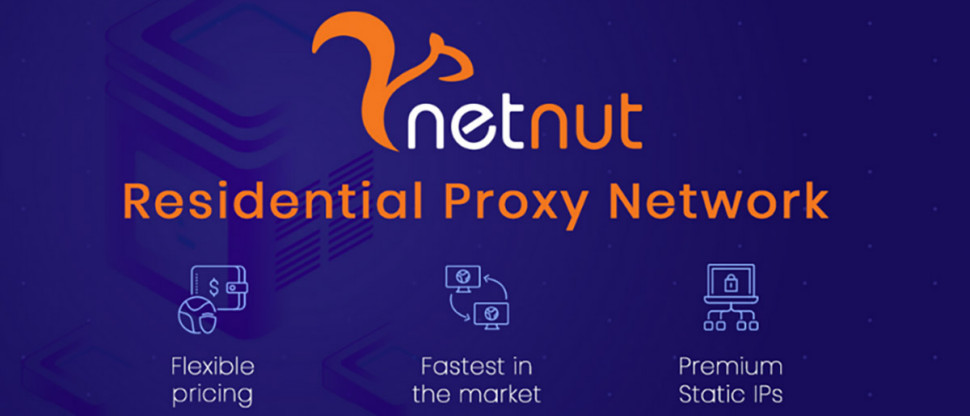TechRadar Verdict
A speedy service which could work for heavy-duty tasks, but with some unanticipated speed bumps.
Pros
- +
Free trial
- +
Fast static proxies sourced direct from ISPs
- +
Fair value for high bandwidth/ request volumes
Cons
- -
High starter prices
- -
Basic support website
- -
Cheapest plans don't include live support, email only
- -
Trial period is only a week
Why you can trust TechRadar
Let’s face it, every proxy provider makes big claims about its speed, but Tel Aviv-based NetNut takes it even further than most:
'Unbeatable prices', the website boasts, with speeds that are 'Lightning- fast' and ‘The fastest in the market,’ ensuring you 'Never Run Out of IP Addresses.'
This is more than just marketing spin, though. While most proxy providers use peer-to-peer (P2P) networks to source their residential IPs, NetNut works with a company called DiviNetworks to acquire them directly from more than 100 ISPs globally. With the usual reliance on end users replaced by direct ISP connectivity, NetNut eliminates a major performance bottleneck to ensure it can scale up better to handle large-scale tasks.
As a very welcome bonus, because these IPs aren't tied to real user devices, you don't have to worry that they'll go poof at any moment. Also, you get to decide how long to keep them for.
These static residential proxies are NetNut's premium product, with 1 million IPs in over 50 countries with 24/7 availability. But if they've overkill for your project, the company also offers more than 52 million rotating residential proxies worldwide (including P2P-sourced IPs), and 110K+ US datacenter for simpler scraping tasks.
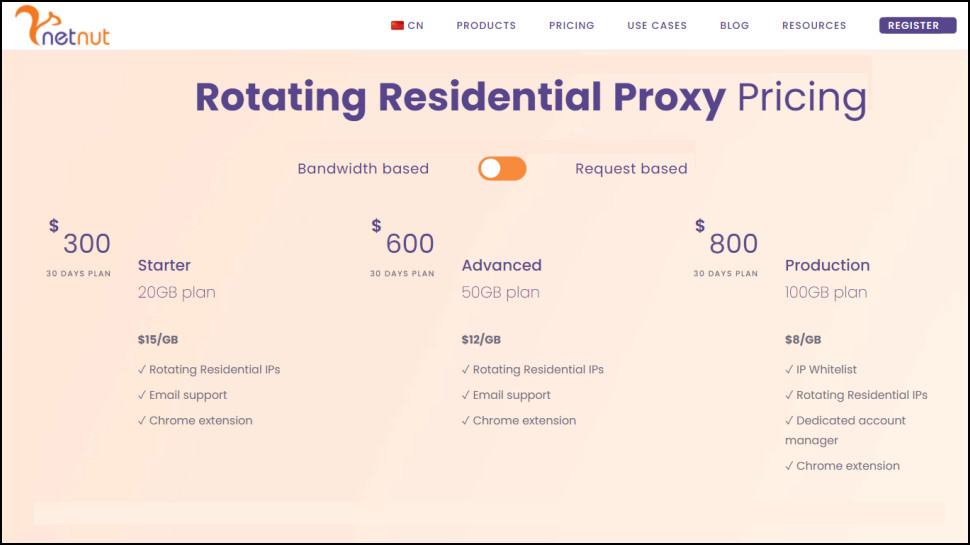
NetNut: Plans and pricing
NetNut used to have a focus on the high-end business market, but these days it has plans for just about every level of user.
The company's US datacenter plans start at just $100 a month for 100GB bandwidth, for instance. There are no concurrency limits to get in your way, so you can run as many connections as you need. The starter plan doesn't have live support - it's email-only - but that's no great surprise as this plan is called ‘Starter.’
Ramping up to the Advanced plan gets you 250GB bandwidth for $185 a month, with live support thrown in (although chat is via Skype, which is hardly convenient.) The $350 Production plan offers 500GB bandwidth and a dedicated account manager, and at the upper end of the range, the Master Plan costs $1000 a month for 2TB traffic.
These plans are not the lowest priced you can find, especially for smaller needs, and you might find better deals at specific price points. The Decodo (formerly Smartproxy) residential plan gives you 8GB traffic for only $52 a month, for instance, which looks relatively cheap. But NetNut scales up well, and overall, its prices are competitive with the top proxy providers.
NetNut's rotating residential proxy comes in a choice of six tiers. The cheapest gives you 20GB for $300 monthly, or $15/GB. Moving up the scale gets you more bandwidth and also extra features. For example, the $800 Production plan supports 100GB traffic, and adds IP allow-listing and a dedicated account manager. And the top-of-the-range $4,000 a month Master plan offers 1TB of traffic, and adds API access and City/ State selection.
NetNut's Datacenter Proxies follow the same pricing pattern. At the bottom is the Starter Plan for $100/month, which provides 100GB, but has only email support. Higher tiers add live support, along with a dedicated account manager.
There are also mobile proxies available, at a cost that starts at $950 monthly for the 50 GB plan.
Again, these are reasonable value for customers with substantial needs, but could be expensive for simpler applications. Beware the feature restrictions, too: even budget providers typically include IP allow-listing, but that's a premium feature here. Read the small print carefully and make sure a plan is giving you everything you need.
There is some good news, though. NetNut offers a free 7-day trial, although this is a short time to get set up, and see how the service works for you.
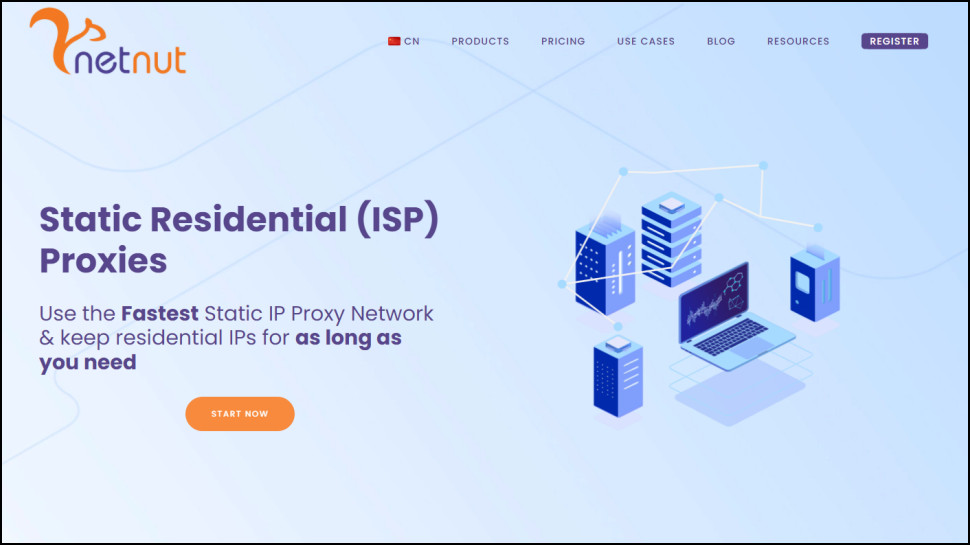
NetNut: Features
NetNut's ISP-sourced proxies bring several benefits, as we've seen. Essentially, you get the stability and performance of data center IPs, combined with the resilience and stealth of residential IPs.
These IPs are accessed via what NetNut calls its 'Super proxies,' load balancers which accept the request and allocate you 'The IP address which is most likely to be available in the requested location.'
There’s no limit to the number of concurrent requests you can send, and in fact NetNut recommends that users initiate as many concurrent sessions as possible for best results. They claim to have customers who send more than 30 million requests every day.
NetNut says that you can use its proxies with all websites, including search engines. The company also offers optimized private proxy pools based on your target to ensure maximum success rates.

The company doesn't offer much in the way of management tools to simplify your use of the service. Decodo has its multi-session X Browser, a zero-coding Smart Scraper tool, a Firefox extension, and more. Unfortunately, NetNut used to have a Chrome extension, which is removed from their website, and we couldn't find it when searching the Chrome store. Too bad, as the Chrome browser is more popular than FireFox.
NetNut: Interface and use
Signing up for NetNut's data center proxies is simple: just choose a plan and hand over your cash (credit cards and Alipay are supported.) If you're after the residential or ISP proxies, you'll need to contact the company and a representative will walk you through the signup process.
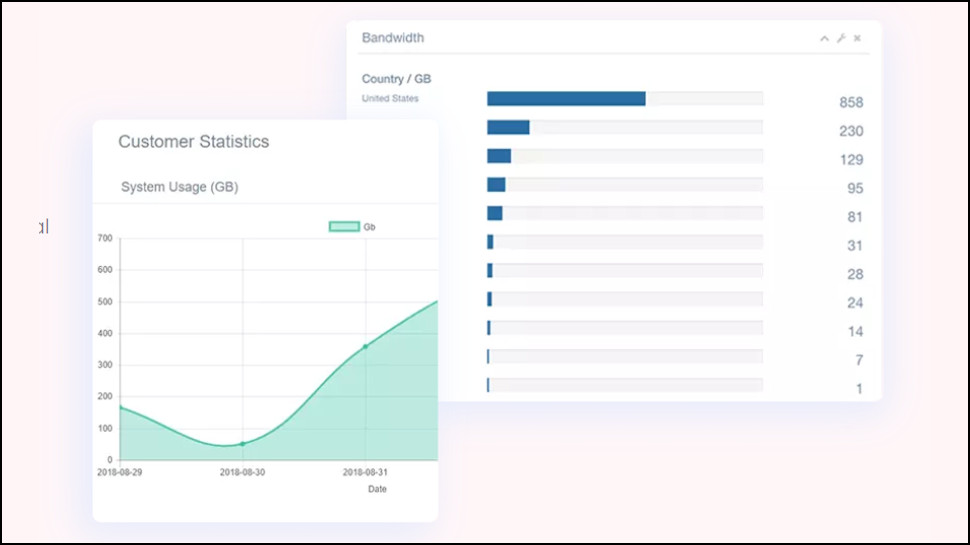
Logging into the NetNut site took us to its web dashboard. This is fairly basic, with little more than the details of your plan, account and billing information, and areas for assorted metrics and usage stats.
We also were not quite sure how to get started. There's a FAQ, but it's the pre-sales type, lacking in the kind of useful detail. We did also look at the blog, which was more useful, and regular and recent content that will be of help to novice users.
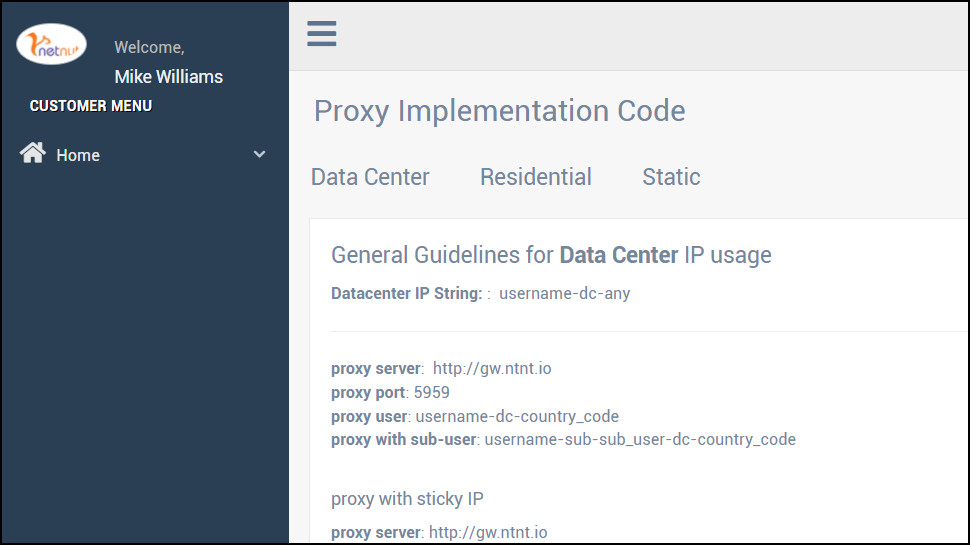
There is some relevant information in the Setup Guide. Sign up and NetNut sends you an email with very basic details, and an Implementation Guidelines page had sample code for C#, Ruby, Java, PHP, Python, Node.js and cURL to cover the likely use case scenarios. The problem here is that these are just a few lines of text, with no background explanation at all, or even any working examples. For example, the entire 'Proxy with sticky IP' section is just these two lines:
proxy server: http://gw.ntnt.io
proxy user: username-dc-country_code-sid-any_number (up to 8 digits)
Uh, what are the country codes? What's the significance of the eight-digit number? These aren't difficult problems, but we expect better presentation, and frankly a little more guidance from a service when you might be paying thousands of dollars a month for.
If you run into difficulties, you could contact support. This is less convenient than usual, with email-only contact on the lesser plans and live chat via Skype, and response times aren't always good (we asked what had happened to the Chrome proxy extension one Sunday evening, for instance, and there was still no reply by the next morning.) But the team has no issues with general operation questions, and we've found they give helpful and accurate advice for most setup and troubleshooting issues. We also did find links for WhatsApp, Telegram and Discord and a live chat, but no phone number. There are also direct emails, with a separate one for sales, and another for support.
NetNut: Final verdict
NetNut's ISP-sourced proxies give it a major advantage over the standard rotating residential competition, but the company doesn't make much effort to simplify setup and usage. Furthermore, compared to the competition, it's relatively costly for small-scale use. It does deliver the features you need for most applications, though, and the seven-day trial shows the company is confident in the service. If you've a demanding project and regular rotating proxies won't do, give NetNut a try, and see if it fits your bill.
We've also highlighted the best proxy and best VPN
With almost two decades of writing and reporting on Linux, Mayank Sharma would like everyone to think he’s TechRadar Pro’s expert on the topic. Of course, he’s just as interested in other computing topics, particularly cybersecurity, cloud, containers, and coding.
- Jonas P. DeMuro
- Mike WilliamsLead security reviewer
